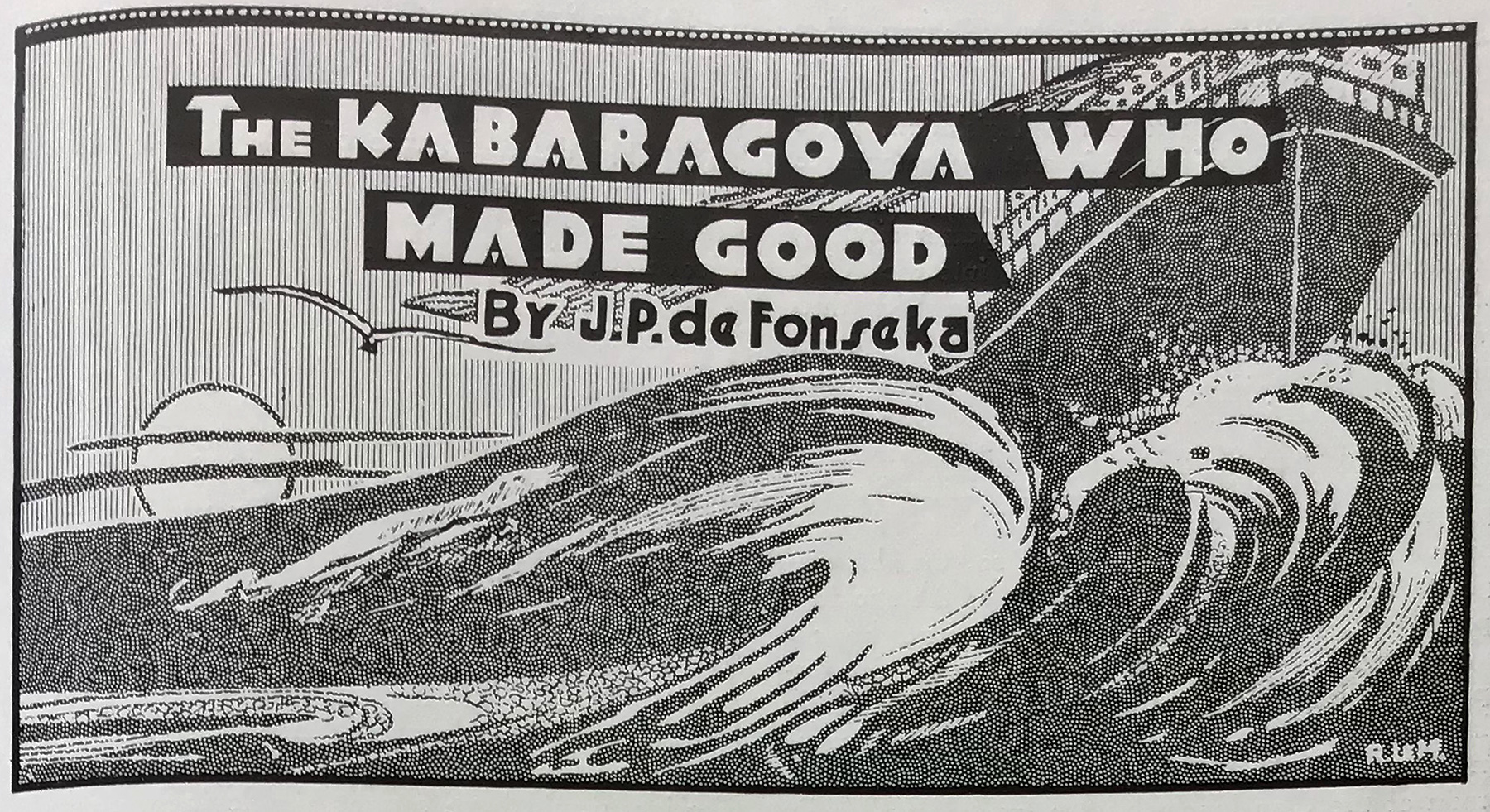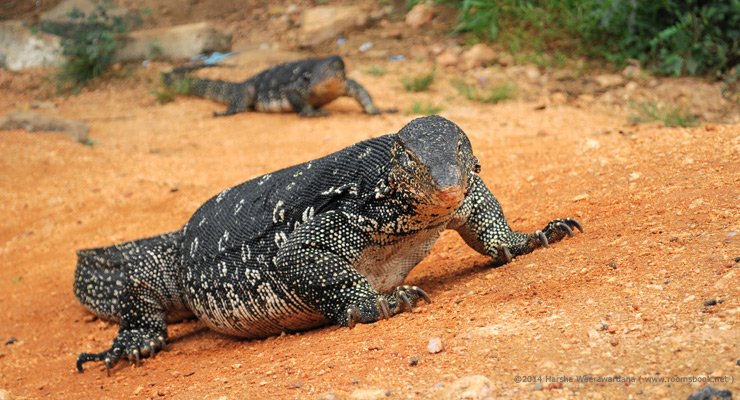
At last someone has treated the Kabaragoya with affection. After a long experience of neglect and hardness of heart from society the kabaragoya has been treated as a living thing entitled to the joy of living.
It happened in Galle, during the floods, a kabaragoya, measuring nearly five feet, had been seen in the rough seas swimming for dear life for a whole day and trying to climb the stern mooring ropes of the Clan Macbeth. When the ship was about to leave, the kabaragoya could do no more than hold on to the outrigger of the pilot’s canoe. The pilot ordered the canoe alongside the steamer. A basket was lowered, and the reptile forced into it and hauled on board. The officers welcomed the visitor. They noosed him and secured him to the ship’s railing on the deck, saying they would make a pet of him.
Like the infant, described by Charles Lamb, who was suddenly translated into the society of angels in heaven and found it rather difficult to adapt himself to the requirements of his new environment, the kabaragoya too must have had double with the problem of his sudden transmogrification. There is undoubtedly an elaborate deportment for ship’s mascots. It becomes more implicated when the mascot is animate and capable of response. And it is reasonable to think that W complication becomes more complicated still when the mascot is a real kabaragoya. Society has too long acted under the rather one-sided idea that the kabaragoya is a beast, which the kabaragoya, in his own way, is. But the kabaragoya is a sensitive soul into the bargain. It may be true, who knows, that the creature has nothing of the kabaragoya but the skin. At any rate no one from among the group of human animals had ever tried to fathom the possibilities of the kabaragoya’s soul. Those kindly ship’s officers will be pioneers among humankind in lids direction.
IMPOSSIBLE, Napoleon said, was a word not to be found in his dictionary. In the same way, one would have thought that the last word likely to be found in the dictionary of a kabaragoya would be pet. But it is the impossible which happens in the lives of Napoleons and kabaragoyas. Napoleon went on to dominate a world, and the kabaragoya has gone on to dominate a ship, both successfully ascending stepping-stones to higher selves. Perhaps the kabaragoya did it with much less self-consciousness. He did not register any considerable inferiority complex or embarrassment or surprise. The glorious revolution of his life apparently came about without conflict, like the glorious British Revolution of 1688. In any case, where a great many humans would have been spoilt by sudden good fortune and suffered from swollen-headedness, the kabaragoya merely allowed the ship’s officers to take occasion by the hand and make his bounds of freedom narrower yet. As the ship sailed away, the beneficent pilot could still descry the creature standing by the railings, a picture of cool dignity and composure heightened by a natural superiority to sea-sickness.
The kabaragoya, as the book explains, is a carrion-eating reptile resembling an Iguana and living in the marshy places In Ceylon, and the kabaragoya in protected by legislation. The more you think of thin prosaic and commonplace life which is the lot of ordinary kabaragoyas the more you are impressed with the personality of the adventurer who gate-crashed into the Clan Macbeth. A mere human who gate-crashed thus would be degraded Into a stowaway and forced Into a Job of work; the kabaragoya is Invested with a sinecure and is F.O.B, A mere stowaway who had read a book or two and had had his ideas of the Clan Macbeth spoilt by the late William Shakespeare, would have quailed before the very thought of such a rash undertaking. Not so, the kabaragoya, who screwed up his courage to the sticking-place. Rightly contemptuous of fiction, he reversed the doctrine of the late William Shakespeare in discovering that the Clan Macbeth actually had the milk of human kindness. To be thus is nothing, but to be safely thus, amid the greatest man of the Clan Macbeth, No kabaragoya really cares for the Ceylon legislation which only secures him from death at the hands of ladies in the Cinnamon Gardens desiring spectacular shoes. But our countryman on board the Clan Macbeth will have life, and have it more abundantly, safeguarded by the Law Merchant, and by Ordinances relating to the British Admiralty and, those failing, by the Common Law of England.
Not all at once, but gradually, our sailor of fortune will learn these things; for even kabaragoyas live to learn, There will be a bit of study to be done on the art and science of being petted, or, as a kabaragoya may put it, the art and science of suffering fools gladly. There will be needed a modified course of Pelmanism and a short one of Wolsey Hall, Oxford, which the ship’s officers keep in stock for all purposes. For what comes naturally to dogs and cats through heredity or the transmitted instinct of generations cannot descend upon a kabaragoya suddenly from the skies. The kabaragoya will be learning the Groundwork of the Reciprocity of Affection. But if he begins with the disadvantage of a complete ignorance of the technique of petting, a similar disadvantage attaches as well to the ship’s officers. These good people have had experience heretofore of dogs and cats, naval fetishes and figureheads. The pioneers in the psycho-analysis of the kabaragoya have yet to find out what degree of his emotion is manifested in the deep pools of his eyes or in the ponderous wag of his tail; whether a responsive kabaragoya will offer his paw or will condescend to stand on hind legs and beg for his tit-bit.
With the acceptance of the kabaragoya as a mascot by the officers of the Clan Macbeth the fortunes of this abandoned creature will improve even in other directions. It is now up to Mr. Epstein to restore him as a symbol of futuristic beauty to the animal art of the world. The obloquy of the past was mainly due to an old fashioned Idea, of a thing not being the right size, and the right sort. If the kabaragoya had been a lizard he could have lived behind the picture frames in the dining-room and been treated to bits of bread dipped in milk by children who feel for the Gecko in his loneliness. If he had been a chameleon and changed into several diverse colours of the rainbow every two minutes artists would have pictured him. If he had been a crocodile he would have fetched a heartfelt human awe and reverence. If he had been a Talagoya, society would have sought him lovingly even if it were only to slay him and eat him in a curry. The edible Talagoya’s tongue was a prized morsel which fond Sinhalese parents have successfully given to their children to eat for the clarification and expansion of their intellect. The tongue eaten raw imparted the genius of Shakespeare, the mind of Newton, the leadership of Pitt or Gladstone. So, the kabaragoya’s world’s worst moment was when he was captured mistaken for a talagoya and hounded out in ignominy as a mere inedible kabaragoya.

The revenge of all these wrongs has now come to the kabaragoya in a flood. On the clan Macbeth he will sail the seven seas, circumnavigating the earth many times over in his mortal life and putting to shame by his wide travels and a large experience of the world all the crocodiles, talagoyas, chameleons and geckoes in their little Ceylon backwaters. The Clan Macbeth will call at Tilbury for the Coronation festivities, and the assembled multitudes will then be representative from the species Homo Sapiens down to species Hydrosaurus Salvator (kabaragoya). For as the old proverb hath it, a Kabaragoya may look at a King, But it is possible that, amid all the good living and the high old time on the Clan Macbeth, our kabaragoya may cast an occasional wistful glance back at his native soil of Galle. Cloyed with the frozen meat and tinned preserves out of the ship’s frigidaires he may welcome for a change a bit of the familiar offal. In those streets paved with gold he may feel suddenly and silently homesick for the marshy places in Ceylon.
Ceylon Observer Annual 1936